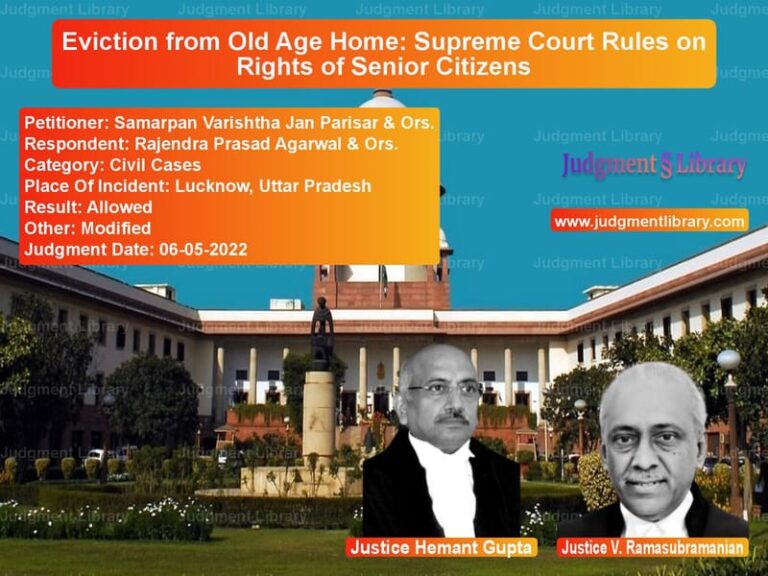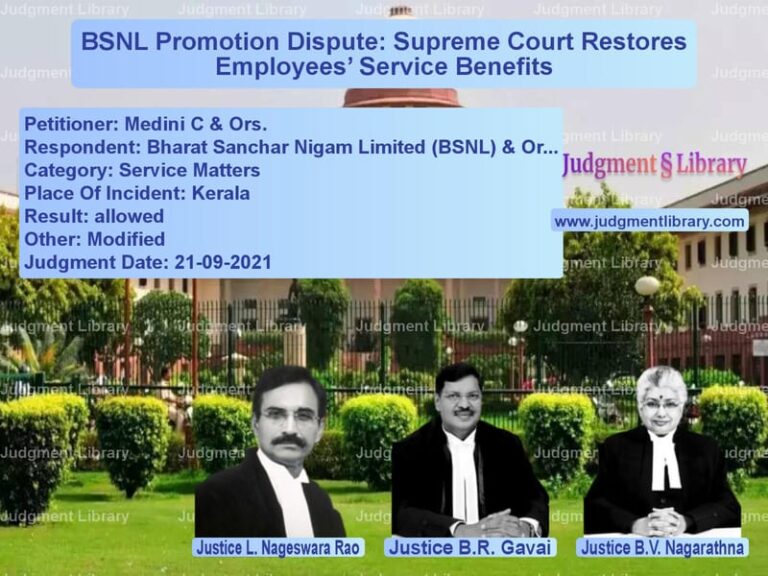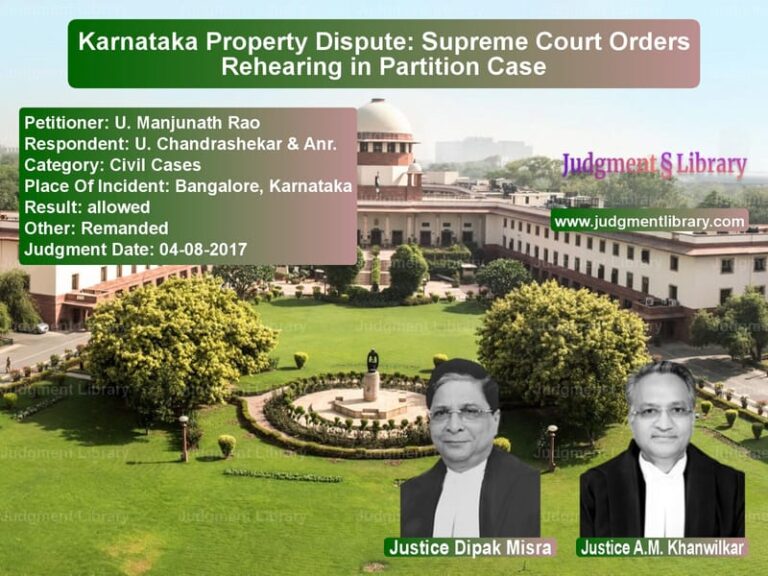Legal Review of Land Disputes and Financial Liability in Amrapali Project
The Supreme Court of India has delivered a significant judgment in the matter of Bikram Chatterji & Ors. v. Union of India & Ors., concerning the financial disputes, land allocation issues, and the rights of builders and property developers involved in the Amrapali Group’s real estate projects. This case highlights the complexities of contractual agreements and financial liabilities between builders, authorities, and homebuyers, as well as the crucial role of judicial intervention in resolving such disputes.
Background of the Case
The case arose from a series of disputes involving the Amrapali Group and its business dealings, particularly the allocation of land and funds for real estate projects in Noida and Greater Noida. The petitioners, primarily builders and developers, had entered into agreements with the Amrapali Group to develop properties in these regions. However, due to mismanagement, delayed projects, and allegations of fund misappropriation, homebuyers, financial institutions, and authorities were left in a state of uncertainty. The petitioners sought relief in the form of financial compensation and rights to certain properties.
The Petitioner’s Arguments
The petitioners, led by Bikram Chatterji, presented the following key arguments:
- Claim to Property Rights: The petitioners argued that they were entitled to a 40% share in certain properties as per the Memorandum of Understanding (MoU) executed between them and the Amrapali Group. The MoU was intended to formalize their participation in the development of a housing project in Indore. They contended that their contributions had led to the acquisition of significant land parcels and that the corresponding share should be legally recognized.
- Contestation of DRT-III Orders: The petitioners challenged the order passed by the Debt Recovery Tribunal (DRT) on 11.12.2018, which attached certain properties belonging to the applicants, including land marked as ‘yellow’ in the Amrapali land allocation maps. They argued that the DRT erred in including this land in the attachment, as it was not part of the properties directly linked to the Amrapali Group.
- Dispute over Liability: The petitioners argued that the financial liabilities pertaining to the development projects were excessive, considering the delays in the construction process and the broader financial strain caused by the real estate sector’s downturn.
- Financial Contribution: The petitioners highlighted that significant amounts had been invested by them and other builders in acquiring land for the projects. They also noted that funds raised from homebuyers had been diverted without proper use, further exacerbating the financial distress in the sector.
The Respondent’s Arguments
The respondents, represented by the Union of India and authorities such as Noida and Greater Noida Authorities, responded with the following points:
- Disputed Ownership: The authorities claimed that the petitioners did not have legal ownership over the land in question, as the areas in ‘yellow’ were not rightfully theirs. The land was merely allocated to them for development purposes, and the authorities maintained that no formal transfer of ownership had occurred.
- Financial Mismanagement: The authorities emphasized that the financial mismanagement of funds by the Amrapali Group was the primary reason for the delay in project completion and the failure to meet contractual obligations. They argued that the petitioners were equally responsible for the outcome due to their involvement in the projects.
- Legal Framework for Land Allocation: The authorities reiterated that the land allocation and the conditions for payment were clearly defined in the lease deeds, and the petitioners had agreed to these terms when entering into the projects. They argued that the rate of interest for dues, including compound interest, had been explicitly mentioned in the agreements and could not be altered retroactively.
Supreme Court’s Observations
The Supreme Court’s observations focused on several critical aspects of the case:
- Validity of the MoU: The Court acknowledged the MoU between the petitioners and the Amrapali Group but clarified that it did not legally bind the authorities or grant automatic rights to ownership. It emphasized that the MoU was an agreement in principle and that formalities regarding land transfer and legal titles were still pending.
- Debt Recovery Procedures: The Court noted that the DRT’s involvement was limited to the financial claims and liabilities of the Amrapali Group and did not extend to the ownership rights of the petitioners. The Court further highlighted that the DRT’s orders regarding attachment of properties were not in line with the agreements that the petitioners had entered into with the Amrapali Group.
- Financial Accountability: The Court stressed that the mismanagement of funds by the Amrapali Group had adversely impacted both the builders and homebuyers. It acknowledged that while the petitioners had invested significant amounts, the failure to complete projects on time had led to legal and financial complications.
- Impact of the Real Estate Crisis: The Court recognized the broader economic downturn in the real estate sector, exacerbated by the COVID-19 pandemic, which had stalled many projects. It noted that this had put financial strain on both developers and homebuyers and affected the ability of authorities to recover outstanding dues.
Supreme Court’s Verdict
The Supreme Court ruled as follows:
- The Court rejected the petitioners’ claim for 40% ownership over the land marked in ‘yellow’ on the map, emphasizing that the MoU did not constitute a legal transfer of land rights and that the petitioners had not fulfilled the legal prerequisites for ownership.
- The Court also upheld the DRT’s decision to attach the properties in question but clarified that the attachment should only apply to the assets of the Amrapali Group, not the assets of the petitioners.
- Regarding the rate of interest, the Court directed the authorities to calculate the dues owed by the petitioners in accordance with the original terms of the agreements, but with consideration for the current economic climate, including the pandemic’s impact on the real estate sector. The Court directed the authorities to reconsider the interest rates being charged, reducing them to more reasonable levels in light of prevailing market conditions.
Key Takeaways from the Judgment
- MoU and Ownership: The Court reaffirmed that a Memorandum of Understanding does not automatically transfer property rights. Formal agreements and compliance with statutory requirements are necessary for property transfer to be legally binding.
- Role of the DRT: The Court clarified the limited role of the Debt Recovery Tribunal in property disputes and emphasized that it should not overstep its jurisdiction by making decisions on ownership without clear legal foundation.
- Financial Accountability in Real Estate: The ruling highlighted the importance of financial discipline and accountability in the real estate sector, particularly when public resources and homebuyers’ investments are at stake.
- Impact of Economic Conditions: The decision acknowledged the challenges faced by the real estate sector due to the economic downturn and the COVID-19 pandemic, which have created significant financial hurdles for developers and homebuyers alike.
Implications of the Judgment
This judgment has several important implications for the real estate sector and property developers:
- It reinforces the need for clear and formal agreements when dealing with property ownership, particularly in large-scale projects involving multiple stakeholders.
- The ruling underscores the importance of transparency and financial management in the real estate sector, where delayed projects and mismanagement of funds can have far-reaching consequences for developers and homebuyers.
- The decision also sets a precedent for how courts may handle disputes related to land allocations and financial liabilities in real estate projects, particularly when multiple parties are involved.
Conclusion
The Supreme Court’s decision in Bikram Chatterji & Ors. v. Union of India & Ors. is a significant ruling in the realm of real estate disputes, emphasizing the need for clarity in land ownership agreements, financial accountability, and the proper functioning of the Debt Recovery Tribunal. The ruling also acknowledges the broader economic challenges affecting the real estate sector, offering some relief to developers while maintaining strict standards for contractual compliance and financial management.
Petitioner Name: Bikram Chatterji & Ors..Respondent Name: Union of India & Ors..Judgment By: Justice Uday Umesh Lalit, Justice Ajay Rastogi.Place Of Incident: Indore, Madhya Pradesh, India.Judgment Date: 07-11-2022.
Don’t miss out on the full details! Download the complete judgment in PDF format below and gain valuable insights instantly!
Download Judgment: bikram-chatterji-&-o-vs-union-of-india-&-ors-supreme-court-of-india-judgment-dated-07-11-2022.pdf
Directly Download Judgment: Directly download this Judgment
See all petitions in Contract Disputes
See all petitions in Property Disputes
See all petitions in Debt Recovery
See all petitions in Landlord-Tenant Disputes
See all petitions in Judgment by Uday Umesh Lalit
See all petitions in Judgment by Ajay Rastogi
See all petitions in dismissed
See all petitions in supreme court of India judgments November 2022
See all petitions in 2022 judgments
See all posts in Civil Cases Category
See all allowed petitions in Civil Cases Category
See all Dismissed petitions in Civil Cases Category
See all partially allowed petitions in Civil Cases Category







